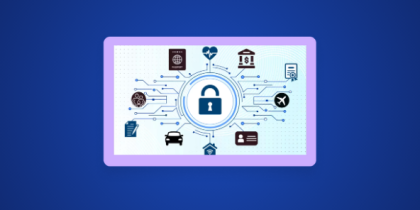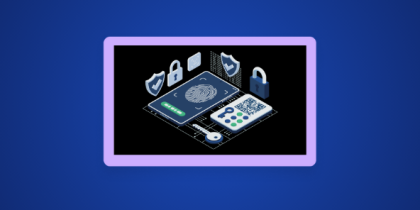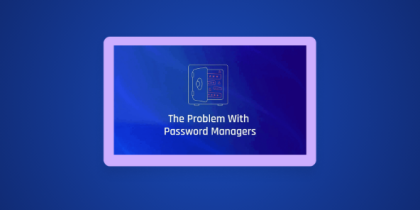Dashlane has long been a go-to password manager, but it doesn’t fit everyone’s needs. With recent product changes, subscription shifts and evolving user expectations, many are now looking for alternatives that deliver greater flexibility, transparency, and options for families or businesses.
In this guide, we’ll break down the top Dashlane alternatives in 2025, compare their features, and help you find the one that perfectly matches your security and usability requirements.
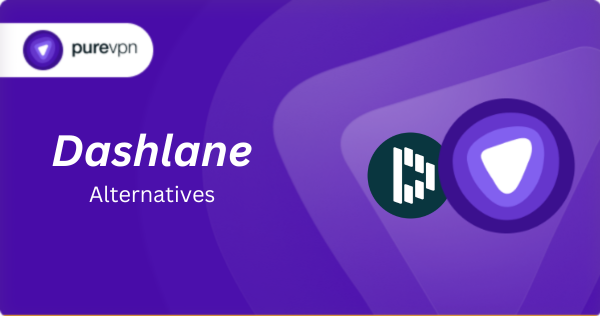
Why Do People Switch to Dashlane Alternatives?
Dashlane is sleek and feature-rich, but it isn’t the right fit for everyone. Here are the main reasons users look for alternatives:
- No free version: Since the free version was discontinued in December 2022, you’re forced into a subscription. Many prefer managers that still offer a solid free tier or cheaper premium plans.
- Closed-source design: Because Dashlane isn’t open-source, users can’t fully verify its security. Privacy-focused people often turn to open-source or independently audited alternatives.
- Expensive family and team pricing: Adding multiple users can get costly fast. Competitors provide more affordable group or family-friendly packages.
- Vendor lock-in: Migrating away from Dashlane can feel complicated. People want simpler import/export tools that make switching painless.
5 Top Dashlane Alternatives in 2025
Here’s a quick snapshot of some top alternatives:
| Alternative | Best For | Highlights | Starting Price |
| PureVPN Password Manager | Privacy-first users | Zero-knowledge encryption, VPN integration, dark web monitoring | ~$2.96 / mo |
| Bitwarden | Open-source enthusiasts | Transparent, audited, generous free plan | Free / $10 yr |
| 1Password | Premium users | Family/team support, secure vaults, polished interface | ~$2.99 / mo (individual plan) |
| Keeper | Teams & enterprises | Granular admin controls, audit logs, secure file storage | ~$3.75 / user / mo |
| NordPass | Everyday users | Modern UI, passkey support, fair pricing | ~$2.99 / mo |
Detailed Comparison of Dashlane Alternatives
To help you decide better, let’s break down some features of Dashlane alternatives in detail:
1. PureVPN Password Manager
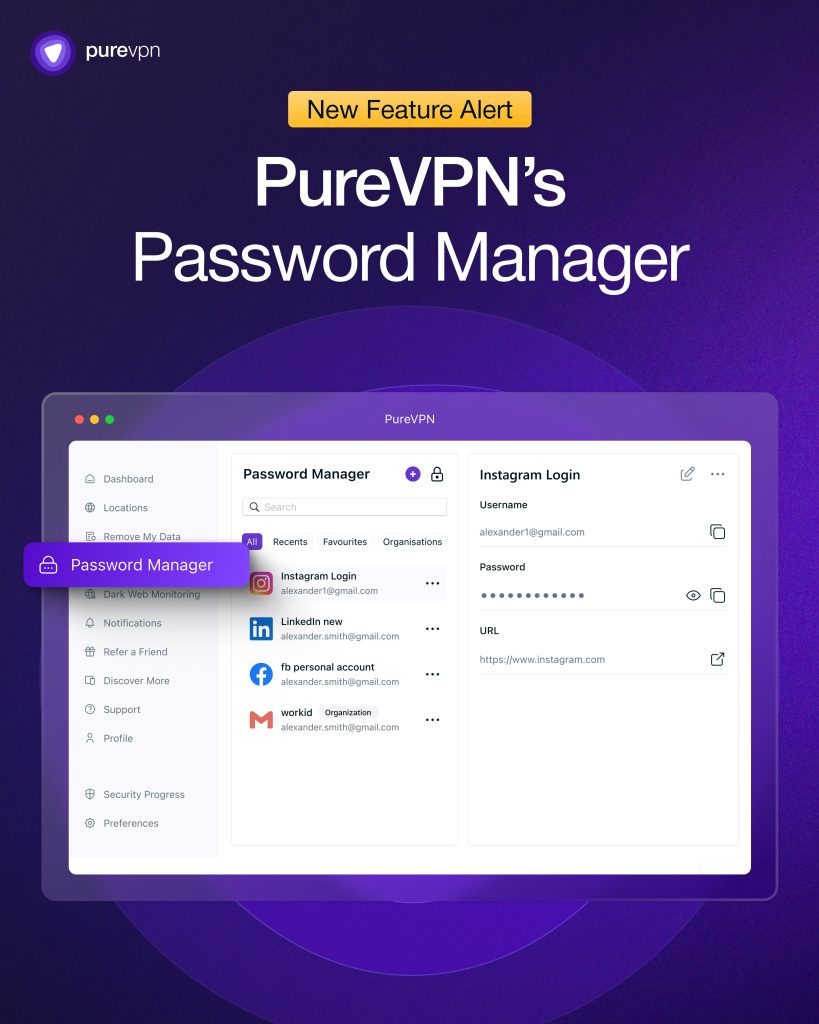
PureVPN Password Manager is built for people who value privacy, convenience, and control. Unlike most tools that only store passwords, this one functions as a complete digital security suite. It’s powered by AES-256 encryption and a zero-knowledge model, ensuring no one, not even PureVPN, can access your vault. Whether it’s passwords, credit card details, crypto recovery phrases, or sensitive notes, everything stays securely stored at all times.
Some noteworthy features include password health checker, cross-device syncing, automatic form detection and autofill capabilities, 2FA support (currently only available on the Web App) and secure credential sharing. Beyond passwords, it integrates VPN protection, dark web monitoring, as well as a tracker and ad blocker, making it a one-stop solution for complete online privacy.
Pros:
- Best-in-class encryption with zero-knowledge architecture.
- Unlimited device sync and secure sharing across platforms.
- Built-in VPN and dark web monitoring for holistic security.
Cons:
- Relatively new compared to legacy brands.
- Free version is expected to launch soon.
2. Bitwarden

Bitwarden is the top open-source password manager trusted by developers, privacy advocates, and everyday users alike. Its fully transparent architecture, combined with independent security audits and open-source code, allows anyone to inspect and verify how it protects your data. You get AES-256 encryption, zero-knowledge protection, and optional self-hosting for maximum control, something few other managers offer.
Bitwarden’s simplicity and affordability make it ideal for both individuals and teams. Its free plan includes unlimited passwords and devices, while the premium version adds tools like a built-in TOTP authenticator, 1GB encrypted file storage, and vault health reports. Though the interface feels more functional than fancy, it’s rock-solid for users who prefer transparency over aesthetics.
Pros:
- 100% open-source and independently audited.
- Free plan with unlimited storage and devices.
- Optional self-hosting for complete control.
- Affordable premium upgrade with advanced features.
Cons:
- Interface less refined than premium alternatives.
- Limited automation or smart breach detection tools.
3. 1Password

1Password delivers a premium experience for families, professionals, and businesses that want seamless usability without sacrificing security. Built on AES-256 encryption and a zero-knowledge framework, it ensures that only you hold the keys to your digital vault. From storing passwords and documents to managing 2FA tokens and passkeys, 1Password makes everyday digital security effortless.
Its intuitive apps across desktop, mobile, and browsers make syncing and autofill fast and reliable. For teams, family sharing and admin controls streamline collaboration while keeping sensitive data private. While the pricing is on the higher side, 1Password’s polished interface, reliability, and attention to user experience make it one of the most refined managers on the market.
Pros:
- Polished and intuitive interface for all platforms.
- Strong AES-256 encryption with zero-knowledge model.
- Family and business plans with advanced sharing tools.
- Excellent autofill and usability features.
Cons:
- No free version available.
- Harder to migrate to other managers.
4. Keeper
Keeper is engineered for businesses and enterprises that require advanced control and compliance-ready protection. With AES-256 encryption, zero-knowledge security, and SOC 2 / FedRAMP certifications, Keeper ensures organizations meet stringent data protection standards. It offers granular admin controls, audit logs, and team management tools, ideal for managing large groups securely.
For personal users, Keeper still offers excellent protection, though its design and pricing structure clearly target professional environments. The secure file storage, role-based permissions, and dark web scanning make it a powerful solution for teams that handle sensitive information daily.
Pros:
- Enterprise-grade encryption and compliance certifications.
- Granular admin controls and detailed activity logs.
- Secure file storage for sensitive business data.
- Trusted by government and enterprise clients.
Cons:
- Higher pricing for individual users.
- Slight learning curve for casual users.
5. NordPass

NordPass combines Nord Security’s proven encryption technology with a sleek, beginner-friendly interface. It uses XChaCha20 encryption, a modern alternative to AES with enhanced speed and security resilience, paired with a zero-knowledge architecture so that your passwords stay visible to you alone. The clean design and one-click autofill make password management simple even for non-tech users.
Cross-platform availability and passkey support mean NordPass is ready for the passwordless future. It’s great for personal users who value usability and design, but business features like detailed admin controls or dark web scanning are still limited compared to premium rivals. Still, its strong encryption, simple setup, and trusted security pedigree make it a solid choice for everyday users.
Pros:
- Advanced XChaCha20 zero-knowledge encryption.
- Sleek, intuitive interface perfect for beginners.
- Cross-platform access with passkey support.
- Backed by the cybersecurity experts at Nord Security.
Cons:
- No full free tier.
- Cloud-only sync (no offline mode).
- Fewer enterprise-grade features.
Switching from Dashlane to Another Password Manager
With the right steps, you can securely transfer all your credentials without losing access.
- Export your Dashlane vault securely.
- Install your chosen manager.
- Import your data and verify logins.
- Test autofill and sync across devices.
- Delete the exported file and close your Dashlane account.
Frequently Asked Questions
Dashlane is secure and user-friendly, but its higher pricing and lack of a free plan make it less appealing to many users. Others prefer open-source or more transparent options, especially after Dashlane shifted to a web-only interface that some found limiting.
While Dashlane offers a polished interface and premium features, it has some notable drawbacks. The free plan has been discontinued, a past clickjacking vulnerability raised brief security concerns, and its cloud-only sync model limits flexibility. For users seeking transparency or more affordable family and team plans, these limitations make Dashlane less than ideal compared to its competitors.
If you’re seeking better value, open-source transparency, or a more flexible setup, switching can be worthwhile. Tools like Bitwarden, PureVPN Password Manager, or NordPass offer zero-knowledge encryption, broader compatibility, and in some cases, free tiers.
When choosing a replacement, make sure to consider factors like end-to-end encryption, multi-device sync, and regular security audits. Extra features like password health checks, dark web monitoring, and 2FA support can make everyday use more secure and convenient.
Conclusion
Switching from Dashlane doesn’t have to be complicated. Whether you’re after open-source transparency, better pricing, or a simpler setup, the best Dashlane alternatives in 2025 offer strong encryption, reliable syncing, and more control over your data.

